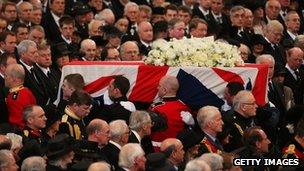Margaret Thatcher: the end of an era
- Published

Lady Thatcher's coffin passed the tomb of the Duke of Wellington - the Iron Lady and the Iron Duke
As the gun carriage bearing Lady Thatcher's coffin came into view, the crowds outside St Paul's sent up a cheer.
Then there was quiet - the silence intensified by shouted commands to the guard of honour, the single tolling bell, and the rhythmical shuffle of the pall bearers' feet.
There were 24 cameras inside the cathedral, but they could not capture the intensity of emotion as the coffin made its slow passage through the Great West Doors.
The 10 military pall-bearers marched slow-step down the cathedral's long central aisle, past the tomb of the Duke of Wellington - the Iron Lady and the Iron Duke together.
With painstaking precision the coffin was placed before the altar, a few paces from the Queen and the Duke of Edinburgh, and a congregation of 2,300, including royalty, prime ministers, foreign ministers and diplomats from 170 countries.
Among the guests were 30 or so of Margaret Thatcher's own cabinet - now elderly men themselves, some a little frail.
Her coffin, draped in the Union Flag, and topped with a display of white flowers, seemed dwarfed by the cathedral's soaring dome, and as the pomp of the procession melted away and it became an intensely personal ceremony.
Anglican service
The service bore the unmistakeable stamp of Lady Thatcher's personality.
There was Charles Wesley's hymn "Love Divine, All Loves Excelling" recalling Lady Thatcher's Methodist upbringing in Grantham where she attended the Wesleyan Chapel often twice on Sundays and during the week as well.
The service began and ended with music from British composers, and there were lines from British poets on the service sheet.
Lady Thatcher's granddaughter Amanda Thatcher read the first lesson, and David Cameron the Gospel, from the King James Bible as she had asked.
There were haunting anthems, including Henry Purcell's setting of Psalm 102, "Hear my prayer O Lord. And let my crying come unto thee".
But for all its imposing stately grandeur, this was the simple Anglican prayer book service, its late medieval language bringing the congregation uncompromisingly face to face with the reality of death.
In his sermon, the Bishop of London Richard Chartres said Lady Thatcher was no longer the Baroness and former Prime Minister, but an individual, equal in death with everyone else.
Life remembered
"After the storm of a life lived in the heat of political controversy", he said, "there is great calm."
Bishop Chartres recalled Lady Thatcher's courage and perseverance, and offered a glimpse of her personality.
He said that at a City function she had grasped his arm and said emphatically: "Don't touch the duck pate, Bishop - it's very fattening".
He spoke too about the type of Christian Lady Thatcher had been - her belief that to make the market, or democratic institutions, work properly, personal qualities such as truthfulness, cooperation with others and mutual sympathy were necessary.
Lady Thatcher had believed in a society of interdependent people, said Bishop Chartres, and in society as the place were people found happiness and salvation.
Her more famous remarks about there being "no such thing" as society, had been misunderstood, he insisted, and referred to "some impersonal entity to which we are tempted to surrender our independence".
The final hymn was the patriotic "I Vow To Thee My Country", and then after a blessing the coffin left as slowly as it had arrived, and, as they caught sight of it, once again the crowds outside cheered.
As the hearse drew away, the half-muffled bells of St Paul's began to ring, the solemnity of the sound hanging in the air.
As the old men of the Thatcher cabinet began to file out amid a mass of black jackets and morning suits, it seemed that an era had passed.